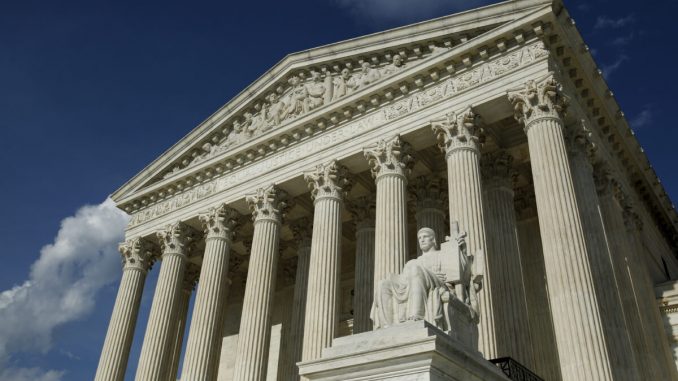

The Biden administration urged the Supreme Court to uphold the felon-in-possession gun conviction of a man even though a high court ruling after the conviction added an additional element to the crime.
The case is United States v. Gary, court file 20-444. The government’s petition seeking high court review of the 4th Circuit Court of Appeals decision was granted Jan. 8.
The petitioner, Michael Andrew Gary, was represented in the telephonic hearing April 20 by Jeffrey L. Fisher. The Department of Justice was represented by Jonathan Y. Ellis. The hearing immediately followed oral arguments at the Supreme Court in a similar case, Greer v. United States, court file 19-8709. It is possible the court will issue a single opinion covering both cases.
Gary was charged with possessing a firearm while a felon, contrary to federal law. When he entered his guilty plea, the district court advised him that this charge required proof that he had a prior felony conviction, according to Gary’s brief.
“But, in line with the unanimous view of the federal courts of appeals at the time, the court did not advise Mr. Gary that the charge required proof that he knew that his prior conviction barred him from possessing a firearm.”
While this case was pending on appeal, the Supreme Court rejected the circuits’ unanimous understanding of the felon-in-possession statute, holding in Rehaif v. United States (2019), that an element of the felon-in-possession offense is the defendant’s “know[ledge] of his status as a person barred from possessing a firearm.”
Gary then asked the 4th Circuit to vacate his guilty plea.
Although he had not objected during the plea process to the district court’s omission of the knowledge-of-status element, Gary argued that the district court’s Rehaif error rendered his plea invalid. The 4th Circuit agreed and vacated his plea.
“The question presented is whether the court of appeals correctly held that the Rehaif error in Mr. Gary’s case entitles him to relief, irrespective of whether he could show a reasonable probability that, but for the error, he would have gone to trial.”
During oral arguments April 20, attorney Fisher said “the due process error here requires automatic reversal.”
“A core aspect of the autonomy every defendant must be afforded is the ability to decide whether to contest the government’s allegations, or instead to relinquish one’s physical liberty without trial and submit to a term of imprisonment.
“Failing to advise the defendant of the complete charge against him necessarily deprives him of the ability to make that grave choice knowingly and intelligently.
“Indeed it would trample the Framers’ vision of free will to enforce a guilty plea where the only facts the defendant admitted do not even constitute a crime and where having now been advised of the true nature of the charge the defendant wants to contest it.”
A skeptical Justice Brett Kavanaugh told Fisher the lawyer was saying it is unfair to the defendant to be convicted when the government wasn’t required to prove the defendant knew he was a convicted felon.
“The 5th Circuit said, well, convicted felons typically know they’re convicted felons. Judge [J. Harvie] Wilkinson said, ‘felony status is simply not the kind of thing that one forgets,’” Kavanaugh said.
“It seems odd to throw out all the convictions if you accept that premise, so, do you accept the premise that convicted felons typically know they’re convicted felons?”
The question should be whether the defendant, at the time he pled guilty, understood that felony status was part of the charge, Fisher said. “In Rehaif, 7 of the justices of this court thought that the element was quite important and in fact it separated wrongful from innocent conduct.”
But government lawyer Ellis suggested this was not a close case.
“The respondent possessed the weapons at issue here. He’d been convicted of 7 different crimes punishable by more than a year in prison. He’d spent multiple years in prison. He’d been released months before. He knew that he was not supposed to possess a gun.”
Justice Elena Kagan challenged Ellis.
“How would he even know what to object to if he didn’t know anything about what the crime was? I mean, how can a defendant make the choice to plead guilty if he doesn’t know what he’s pleading to?”
This is a developing story. It will be updated.





Be the first to comment